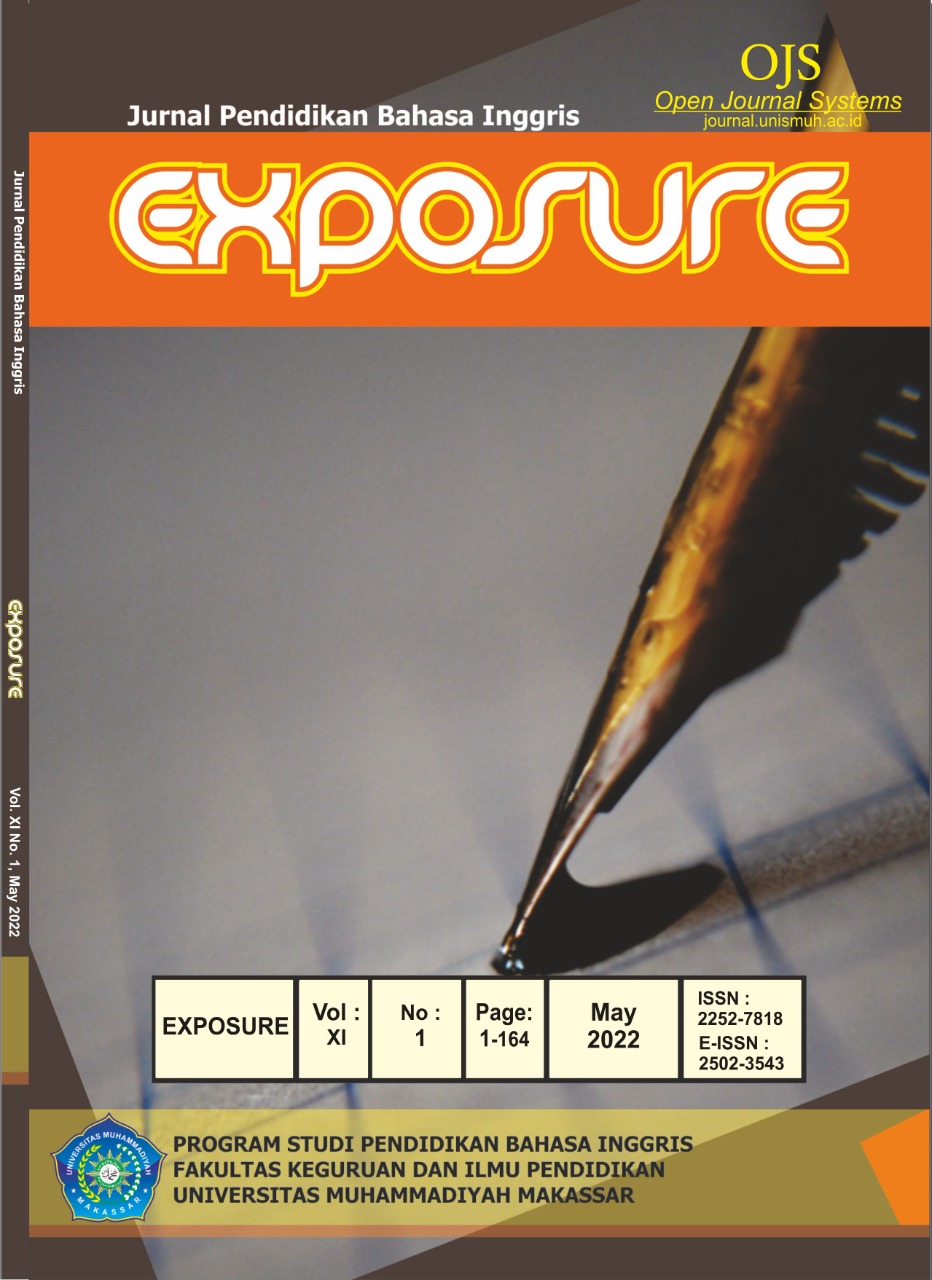HIGH SCHOOL STUDENTS’ DIFFICULTIES IN ENGLISH SPEAKING SKILLS OF NAMLEA, BURU ISLAND
DOI: https://doi.org/10.26618/exposure.v11i1.6352
Speaking, Foreign language, difficulties, Causes
Abstract
The study aims at exploring the speaking difficulties encountered by high school students and investigating the causes of such difficulties at Namlea , Buru Island The researcher implemented a descriptive qualitative method to describe the speaking difficulties found by high school students at Namlea, Buru Island . The researcher designed an interview to find the data and observed the students speaking. The interview was conducted for each student to investigate speaking difficulties and the causes of such difficulties. The results showed there some difficulties in faced by student in speaking due to some reasons such some students have inadequate English vocabulary, spelling & pronunciation, problem. Students are lack grammatical understanding. This research also indicated several factors that cause the students difficulties, such as; Students’ paradigm, motivation, the lack of language environment support, few chances to practice speaking in the learning process.
References
Abdurrahman, M. (2019). Anak berkesulitan belajar
Agung, A. S. N. (2019). Current Challenges in Teaching English in Least-developed Region in Indonesia. Soshum: Jurnal Sosial dan Humaniora, 9(3), 266–271.
Ahmed, S. (2015). Attitudes towards English Language Learning among EFL Learners at UMSKAL. Journal of education and practice, 6(18), 6-16.
Aziz, M. (2019). Understanding English Speaking Difficulties: Implications for the English Language Curriculum for the Arab Students in a Pakistani University. English Language Teaching Research. Vol. 6 (3).
Babu, R. (2010). Teaching Spoken English for Non-native Students: Problems, Solutions and techniques. Online): http://www. eltweekly. com/elt-newsletter/2010/06/60-articleteaching-spoken-english-for-non-native-students-problems-solutions-and-techniques-by-aramesh-babu/.(March 15, 2011).
Brown, H. D., & Abeywickrama, P. (2010). Language assessment: Principles and classroom practices (Vol. 10). Pearson Education White Plains, NY.
Chen, Z., & Goh, C. (2011). Teaching oral English in higher education: Challenges to EFL teachers. Teaching in Higher Education, 16(3), 333-345.
Coleman, H. (2010). Teaching and learning in Pakistan: The role of language in education. Islamabad: The British Council, 148-157.
Efrizal, D. (2012). Improving students’ speaking through communicative language teaching method at Mts Ja-alhaq, Sentot Ali Basa Islamic boarding school of Bengkulu, Indonesia. International Journal of Humanities and Social Science, 2(20), 127-134.
Hadijah, S. (2014). Investigating the problems of English speaking of the students of Islamic boarding school program at Stain Samarinda. Dinamika Ilmu: Jurnal Pendidikan, 14(2), 240-247.
Ihsan, M. (2018). Using the participation point system in teaching speaking skills. English Education Journal, 9(2), 176-191.
Lightbown, P. M., & Spada, N. (2021). How Languages Are Learned 5th Edition. Oxford university press.
Nazara, S. (2011). Students' perception on EFL speaking skill development. JET (Journal of English Teaching), 1(1), 28-43.
Rahmaniah, R., Asbah, Nurmasitoh (2018). The Speaking Difficulties Encountered by Non-English Students in Language Classroom. Journal of English Language Teaching and Linguistics (JELTL). Vol. 11 No. 2.
Richards, J. C. (2008). Teaching listening and speaking (p. 48). Cambridge: Cambridge university press.
Shteiwi, A. A., & Hamuda, M. A. (2016). Oral communication problems encountering english major students: Causes & remedies. International Journal of Social Science and Humanities Research, 4(2), 19-26.
Solak, E., & Bayar, A. (2015). Current challenges in English language learning in Turkish EFL context. Participatory Educational Research, 2(1), 106-115.
Sugiyono, M. (2015). Penelitian Kombinasi (Mixed Methods).
Wang, Z. (2014). Developing Accuracy and Fluency in Spoken English of Chinese EFL Learners. English language teaching, 7(2), 110–118.
Downloads
Published
How to Cite
Issue
Section
License
Authors who publish with this journal agree to the following terms:
In order to assure the highest standards for published articles, a peer review policy is applied. In pursue of the compliance with academic standards, all parties involved in the publishing process (the authors, the editors and the editorial board and the reviewers) agree to meet the responsibilities stated below in accordance to the Journal publication ethics and malpractice statement.
Duties of Authors:
- The author(s) warrant that the submitted article is an original work, which has not been previously published, and that they have obtained an agreement from any co-author(s) prior to the manuscript’s submission;
- The author(s) should not submit articles describing essentially the same research to more than one journal;
- The authors(s) make certain that the manuscript meets the terms of the Manuscript Submission Guideline regarding appropriate academic citation and that no copyright infringement occurs;
- The authors(s) should inform the editors about any conflict of interests and report any errors they subsequently, discover in their manuscript.
Duties of Editors and the Editorial Board:
- The editors, together with the editorial board, are responsible for deciding upon the publication or rejection of the submitted manuscripts based only on their originality, significance, and relevance to the domains of the journal;
- The editors evaluate the manuscripts compliance with academic criteria, the domains of the journal and the guidelines;
- The editors must at all times respect the confidentiality of any information pertaining to the submitted manuscripts;
- The editors assign the review of each manuscript to two reviewers chosen according to their domains of expertise. The editors must take into account any conflict of interest reported by the authors and the reviewers.
- The editors must ensure that the comments and recommendations of the reviewers are sent to the author(s) in due time and that the manuscripts are returned to the editors, who take the final decision to publish them or not.
Authors are permitted and encouraged to post online a pre-publication manuscript (but not the Publisher’s final formatted PDF version of the Work) in institutional repositories or on their Websites prior to and during the submission process, as it can lead to productive exchanges, as well as earlier and greater citation of published work (see The Effect of Open Access). Any such posting made before acceptance and publication of the Work shall be updated upon publication to include a reference to the Publisher-assigned DOI (Digital Object Identifier) and a link to the online abstract for the final published Work in the Journal.














